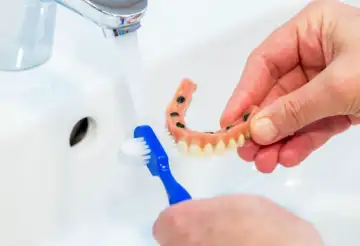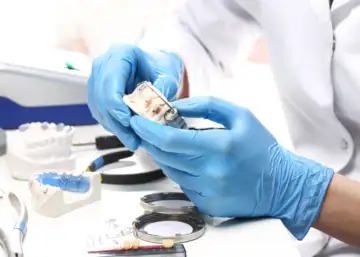As we age, the natural wear and tear on our teeth can lead to significant oral health challenges, from tooth loss to persistent discomfort, often impacting daily life.
When these issues become a hindrance, considering dentures may become a necessary step towards restoring comfort and function.
While the prospect of false teeth might seem daunting, contemporary dentures have evolved considerably. Today’s solutions are designed to be more advanced, comfortable, and remarkably natural-looking, offering a practical and confidence-boosting answer for many individuals facing dental difficulties.
For those uncertain about whether dentures are the right path, expert guidance is available. We consulted leading dental professionals who shared key reasons why people choose dentures to regain their oral health and, ultimately, their radiant smile.
1. You’re missing several teeth
The most common reason people get dentures is down to missing teeth.
“If you’re missing several teeth, having individual implants and bridges fitted can be costly,” says Dr Anni Seaborne, head of general dentistry at Bupa Dental Care. “Dentures can offer an easier and more affordable way to restore your ability to eat, speak and smile with confidence.”
2. You have gum disease or are at high risk of tooth decay
Advanced gum disease, also known as periodontitis, can lead to tooth loss and gaps in the smile, explains Dr Fazeela Khan-Osborne, principal implant and restorative surgeon at Harley Street practice One to One Dental.
“Gum disease can also wear away the bone and so immediate dentures might be necessary,” says Khan-Osborne.
Seaborne agrees and adds: “In cases of gum disease, dentists may recommend dentures over implants or bridges because they don’t rely on the stability of surrounding teeth or gums. They’re also adaptable, meaning teeth can be added over time, helping to reduce the need for repeated major treatments.”
3. You’re unable or don’t want to have surgery
 “For some people, dental implants might not be an option because they don’t want surgery or can’t have surgery due to existing health conditions,” explains Seaborne. “Dentures offer a non-invasive, non-surgical alternative, making them suitable for a wider range of patients.”
“For some people, dental implants might not be an option because they don’t want surgery or can’t have surgery due to existing health conditions,” explains Seaborne. “Dentures offer a non-invasive, non-surgical alternative, making them suitable for a wider range of patients.”
4. You have low bone levels
“Implants need strong bone to secure the screw in place and can’t be fitted if bone levels are too low,” says Seaborne. “Being non-invasive, dentures provide a reliable replacement option without relying on bone support.”
5. Missing teeth are causing bite alignment issues
“Missing teeth affect how biting forces are distributed. With fewer teeth, more pressure is placed on the remaining ones, which can stress your teeth and lead to damage,” explains Seaborne. “Dentures help to restore even force distribution, helping to protect neighbouring teeth and stopping them from shifting.”
6. You want better lip support
“Your front teeth help to support your lip structure and losing them can cause your lips to collapse inward, creating a sunken appearance,” says Seaborne. “Dentures can restore this natural support, helping to maintain facial structure.”
How to start your journey with dentures:
 “It is important to act quickly. If you have loose teeth, advancing gum disease or missing teeth, it is important to seek professional advice,” says Khan-Osborne. “Dentures are the most affordable way of replacing teeth. However, they do not stop the bone from wearing away.”
“It is important to act quickly. If you have loose teeth, advancing gum disease or missing teeth, it is important to seek professional advice,” says Khan-Osborne. “Dentures are the most affordable way of replacing teeth. However, they do not stop the bone from wearing away.”
Depending on how many teeth you have missing, you may have a complete or partial denture. According to the NHS website, complete dentures can be used to replace all upper or lower teeth, while partial dentures can be used to fill the gaps left by one or several missing teeth – giving you flexibility based on your individual needs.
The NHS website also states that most people need to pay for NHS dental treatment, and dentures are classed as a band 3 treatment under NHS dental charges, so usually cost around £326.70. However, some people are entitled to free NHS dental treatment in England.
You can also pay to have dentures fitted with a private dentist, and the cost can vary a lot depending on the type of dentures you choose and the material they’re made from.
“If you have lost all your teeth, the dentures have to be gum-supported, which makes things trickier,” says Khan-Osborne. “Going to a dentist regularly will save you further complications and also money.”
To make dentures, your dentist will first measure your mouth and use putty to create a mould or take a scan of your mouth, according to the NHS website. It usually takes a few weeks for dentures to be made and you’ll be given another appointment to have them fitted.
What are the alternatives to dentures?
Alternative dental treatments that can be used to replace missing teeth include bridges and dental implants.
Bridges are fixed to other teeth in your mouth and cannot be removed, whereas dental implants are fixed to your jawbone to replace the roots of your teeth and can help support crowns or some types of dentures, according to the NHS website.
